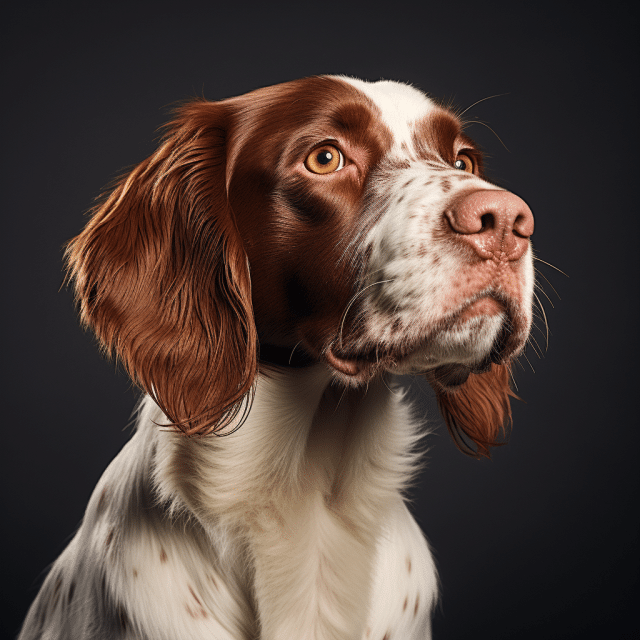Is a Brittany a Good Family Dog?: Did you know 80% of Brittany owners say they’re perfect for families? As you’re considering a furry addition to your household, you might be wondering, “Is a Brittany a good family dog?” We’ll explore their history, temperament, and health, and assess how well they adapt to various environments. So, you’ll find out if this breed’s compatibility with children and active lifestyle fits the dynamics of your family. Let’s discover if a Brittany is the right choice for you.
Understanding the Brittany’s Breed History
Before you can fully appreciate a Brittany’s suitability as a family dog, it’s important you delve into the history of the breed. Originating from the French province of Brittany, these dogs were bred for hunting, specifically bird hunting. This history has bestowed upon them a high level of energy and agility that they still possess today.
Brittanys, unlike some other breeds, weren’t bred to be lap dogs or solely companion animals. They were worker dogs, bred to be out in the fields, running and retrieving. This is important to understand because that energy and need for activity hasn’t disappeared simply because many Brittanys now live in suburban homes. They still have that instinctual drive to work and run.
This history of being a working breed has also given the Brittany a high level of intelligence. They’re quick learners, which can be a boon when it comes to training. However, it’s important to remember that this intelligence means they need mental stimulation as well as physical. They’re not a breed that’s content to lie around all day.
Finally, Brittanys are known for their sociability. Historically, they worked alongside humans and other dogs, so they’re naturally inclined to be friendly and cooperative. This makes them good family dogs, as they’re generally good with children and other pets.
Understanding the Brittany’s history gives you a clearer picture of what to expect from the breed. It helps you understand their needs and how well they might fit into your family.

The Temperament of a Brittany Dog
When assessing a Brittany’s temperament, you’re likely to find them exhibiting a blend of energy, sociability, and intelligence. These medium-sized dogs are known for their lively and playful nature, which makes them great companions for active families. They’re also social animals who thrive on interaction, so you’ll find them happiest when they’re around their favorite humans or other pets.
But it’s not just their energy and sociability that make them stand out. Brittanys are also highly intelligent dogs. This means they’re fast learners who can quickly pick up new commands or tricks. However, their intelligence also means they need mental stimulation to keep them happy and prevent boredom. Interactive toys, puzzle games, or agility training can be great ways to engage their minds.
While Brittanys are generally good-natured, they can be sensitive. They respond best to positive reinforcement training methods and don’t do well with harsh correction. They’re also known to be somewhat independent, which can sometimes be mistaken for stubbornness. But with consistent, patient training, they can become obedient and well-behaved pets.
One potential challenge with a Brittany’s temperament is their high energy levels. They require regular, vigorous exercise to burn off their energy and stay happy and healthy. If they don’t get enough exercise, they can become restless and develop problematic behaviors.
Training and Exercise Needs of a Brittany
You’ll find that a Brittany’s need for exercise and mental stimulation is as important as their need for your love and affection. These agile dogs have a high energy level which needs to be channelled into constructive activities, otherwise, they may resort to destructive behavior like chewing or digging.
Training a Brittany is relatively straightforward if you start early and use positive reinforcement techniques. They’re intelligent and eager to please, which aids in their trainability. However, they can be sensitive, so harsh training methods are a strict no-no.
Regarding exercise, Brittany’s need at least an hour of vigorous exercise daily. This could include walks, runs, and playtime. They also excel in dog sports like agility, obedience, and field trials, which not only provides physical exercise but mental stimulation as well.
Here’s a brief table summarizing their training and exercise needs:
| Training Needs | Exercise Needs |
|---|---|
| Start early | At least an hour daily |
| Use positive reinforcement | Includes walks, runs, playtime |
| Avoid harsh methods | Participate in dog sports for mental stimulation |
Health and Lifespan Expectations for a Brittany
As a prospective Brittany owner, you need to be aware of the breed’s general health conditions and lifespan expectations, and it’s important to remember that every individual dog’s health can vary. Generally, Brittanys are quite healthy dogs, often living between 12 to 14 years. This breed is known for its robust health, but like all breeds, they’re prone to certain health conditions.
Hip dysplasia, a condition where the hip joints don’t develop properly, leading to arthritis, is one potential issue Brittanys might face. Epilepsy and hypothyroidism, affecting the dog’s metabolism, are other conditions that can affect this breed. Regular check-ups with the vet can help identify these issues early on, and treatment can manage most conditions effectively.
Brittanys can also be susceptible to ear infections due to their long, floppy ears. Regular cleaning can help prevent this. It’s also important to keep an eye on their weight. Brittanys love to eat, and if they’re not getting enough exercise, they can easily become overweight, leading to further health complications.
A key factor in ensuring your Brittany’s good health is proper nutrition. A balanced diet, tailored to their age, size, and activity level, is crucial. Regular exercise is another vital aspect of their care. Brittanys are active and energetic dogs, and they require plenty of physical activity to stay healthy.
How Well Do Brittanys Get Along With Children
In considering the compatibility of Brittanys with children, it’s essential to note their temperament and energy level, but also take into account your family’s lifestyle. Brittanys, known for their friendly demeanor and high energy, can be a fantastic addition to your family. They’re often playful, gentle, and able to match the energy of active children, making them an excellent playmate.
However, it’s also crucial to keep in mind that Brittanys need regular exercise to keep them happy and healthy. If your family enjoys outdoor activities like hiking or playing catch in the backyard, a Brittany can be a perfect fit.
Here’s a brief table to help evoke the essence of these points:
| Brittany Traits | Compatibility with Children | Implication for Family Lifestyle |
|---|---|---|
| High Energy | Matches with Active Children | Family should be Active |
| Playful and Gentle | Great Playmate for Kids | Need for Supervision |
| Need for Exercise | Can Encourage Outdoor Activities | Active Lifestyle Recommended |
On the flip side, if your family leads a more sedentary lifestyle, this breed may not be the best fit, as they could become restless and potentially destructive without sufficient activity. Furthermore, while Brittanys are generally good-natured, their exuberance might be overwhelming for very young children.
The Brittany’s Adaptability to Different Living Environments
When it comes to adapting to different living environments, you’ll find that a Brittany is quite versatile, thriving both in the bustle of city life and the open spaces of the countryside. These dogs are known for their adaptability and resilience, making them a great fit for various living situations.
In the city, a Brittany’s compact size and sociable nature make them suitable for apartment life, as long as they’re provided with sufficient exercise and mental stimulation. They’re relatively quiet dogs, so you won’t have to worry about them disturbing your neighbors. However, they can be quite energetic and require daily walks and playtime to burn off energy. They’re also intelligent and curious, so a stimulating environment with plenty of interaction is key.
On the other hand, if you’re living in the countryside, a Brittany will thrive in the open spaces. Their hunting heritage means they love to be outside, exploring and chasing. They’re great at games like fetch and will happily spend hours running around in a secure yard. They can adapt well to the changing seasons and are just as happy in the cold winter months as they are in the warm summer ones.
Whether in an apartment in the city or a house in the country, a Brittany can adapt and thrive. However, they do best in an environment where they are a full-fledged member of the family, receiving plenty of love, attention, and stimulation. So, if you can provide this, a Brittany could be the perfect addition to your family, regardless of where you live.

Frequently Asked Questions
What Is the Average Cost of Owning a Brittany?
Just like maintaining a car, owning a Brittany isn’t cheap. You’re looking at an initial cost between $800 to $1,200 for a puppy. But that’s just the start. You’ll also need to budget for food, vet bills, grooming, and other miscellaneous costs. Annually, you can expect to spend between $500 to $1,000. However, these costs can rise if unforeseen health issues arise. So, owning a Brittany is a financial commitment that shouldn’t be taken lightly.
Are Brittanys Hypoallergenic Dogs?
You’re asking if Brittanys are hypoallergenic dogs. Unfortunately, no breed is entirely hypoallergenic, including Brittanys. They do shed, but less than many other breeds, which might make them a better choice if you’re sensitive to dander. However, it’s crucial to spend time with a Brittany before deciding to bring one home, to see if you have an allergic reaction. Remember, everyone’s allergies are different, and what works for one person might not work for another.
How Often Should a Brittany Be Groomed?
Just like keeping your garden pruned, a Brittany requires regular grooming to stay fresh and healthy. You should groom your Brittany at least once a week. This breed’s coat traps dirt and debris, so frequent brushing is necessary to prevent matting and keep their coat clean. Additionally, regular ear cleaning and nail trimming are essential to maintain their overall health. Remember, a well-groomed Brittany is not just beautiful, it’s a sign of a well-cared-for pet.
Is It Easy to Find Brittany Puppies From Breeders?
Yes, it’s relatively easy to find Brittany puppies from breeders. You’ve got to do some research to find reputable breeders, though. Look for breeders who perform health checks on their dogs, provide proper care, and are knowledgeable about the breed. Always visit the breeder in person to check the conditions the puppies are raised in. Remember, a good breeder will also ask you questions to ensure their puppies are going to suitable homes.
What Type of Diet Should a Brittany Be On?
You’re asking about the ideal diet for a Brittany. These energetic dogs need a balanced, high-quality diet that suits their lifestyle. Protein should make up about 18-25% of their food, to support their muscular health. They’ll also benefit from healthy fats for energy, and complex carbs for sustained stamina. Remember, each dog’s needs are unique. It’s always wise to consult with your vet to tailor a diet plan that’s best for your Brittany.
Conclusion
In short, Brittanys are the Ferrari of family dogs – high energy, sleek, and full of life. They’re like sports stars, with their active nature and need for training. But, they’re also pocket-sized physicians, boasting a lifespan that rivals a tortoise! Add in their child-friendly disposition and adaptability, Brittanys are the ultimate canine package, suitable for any family setting. So, if you’re looking for a four-legged family member, a Brittany should be your top contender!


